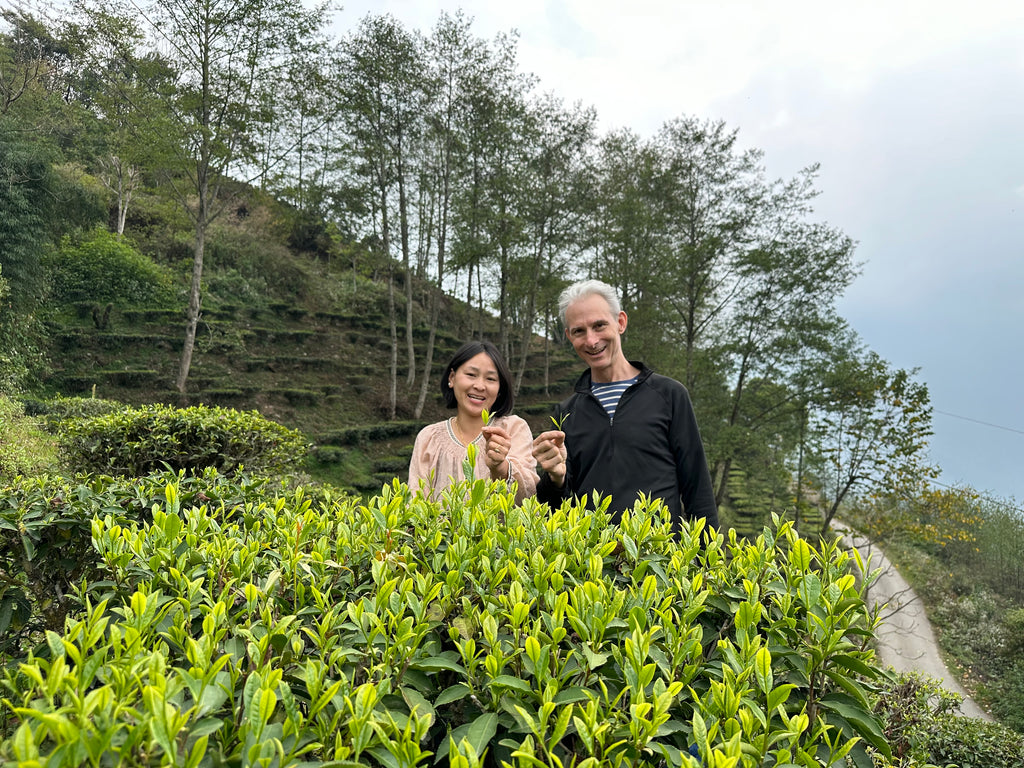2024 Spring Tea Sourcing Report

It's been a busy few months for Sebastian on the tea road, and we can't wait for you to taste what we've found from tea friends new and old. Get the scoop on this year's harvest and see what we've got brewing!
Taiwan
We began our spring sourcing on the island of Taiwan, starting with a trip to the venerable Wistaria Tea House in Taipei. This tranquil sanctum dates back to the 1920s, when it was built under Japanese occupation as a residence for the imperial governor. Today it's a landmarked historic site and the home of some of Taiwan's best teas. Wistaria was ground zero for Taiwan's tea renaissance during the 1970s and '80s, and you can argue its influence has even been felt on the mainland as well.

We caught up with current owner Sophie Lin, who along with her daughter, Amie, has been busy opening a Paris branch of the brand. We tasted some excellent pu-erh that was blended and aged by the tea house's founder, Zhou Yu, and some oolongs that show off the refined craft of Taiwanese tea making. If you're planning a visit to Taipei, you've got to stop at Wistaria, and you should do it sooner rather than later—the tea house will temporarily close this summer for necessary structural renovations.
Once we got our bearings in Taipei, a train to nearby Taoyuan brought us to the home of our friend Mr. Zhang, who makes the beloved Spring Fortune and Black Gold. Zhang practices beyond organic farming, eschewing not just pesticides and fertilizers, but conventional pruning techniques aimed at increasing yield. He lets his tea plants grow naturally amid wild plants and sphagnum moss that nourish the soil. The result is a smaller yield of truly spectacular tea that bursts with flavor, texture and complexity. He's currently experimenting with a tea plant variety that's indigenous to Taiwan, to see how it performs in his semi-wild conditions.

From his private stash, Zhang shared some of his Black Gold that he's been aging for a decade. His advice to us: buy it and age it in our warehouse for an additional six years before releasing it to the public! This kind of controlled aging is common in Taiwan and China, and we're excited for you to taste our new lot of Black Gold.

Sikkim
If you're not hip to what's happening at the Bermiok Estate in Sikkim, you're missing out on some of the most interesting Himalayan tea we've enjoyed in years. Once an independent kingdom that was annexed by India in the 1970s, Sikkim is the first Indian state to decree that all agriculture within its borders must follow organic practices. The tiny (but growing) Bermiok Estate is a tea garden with a social mission, aimed at providing work opportunities in a remote, rural region to grow value-added crops like tea and coffee. The garden produces classic Darjeeling style first and second flush black teas and is hard at work on innovative styles like the intriguing Garuda oolong.
Co-owner Nikhil Pradhan introduced us to the garden's new manager, Samrat Rana, who showed us new fields where additional tea plants are being cultivated to increase the garden's yields. Organic farming comes at a cost, and Bermiok has been dealing with pests that at times have chewed through whole sections of tea plants, effectively eradicating those harvests. More plants and assiduous organic pest management techniques will help, though as climate change encourages weather conditions favorable to pests, it's a tricky battle for growers all over. This is one of the reasons we're sympathetic to mostly-organic farmers that may use conventional pesticides once in a while, even at the expense of an organic certification.

Previously, Bermiok has relied on visiting tea makers from Darjeeling who make the trip over during harvest to help process tea. Rana's role is to provide guidance in the fields and factory year-round, as Pradhan continues work on a retail shop in Sikkim's capital city of Gangtok to promote the garden's teas. Pradhan also shared a light and fragrant first flush scented with Bermiok's very own jasmine blossoms—a beautiful tea.

Darjeeling
Severe drought has affected the Darjeeling region this winter and spring, significantly lowering yields of the year's most valuable harvest. Sometimes, tea benefits from these conditions, which can result in concentrated and flavorful brews, like an ice wine. Other times dry weather can negatively impact overall quality. We saw a bit of both in this region.
It's a rough time to make tea in Darjeeling. Around 50 of its 87 registered estates are currently up for sale, passing between far-off owners who pay little attention to gardens' needs in order to squeeze greater profits from factories that often require urgent improvements. This is not the case at gardens owned by the Tea Promoters Group, a company founded in 1980 that runs five estates in Darjeeling as well as tea operations in Assam, the Dooars and elsewhere in India. We trucked around with Gautam Mohan to see how they're investing in their gardens and the people who make tea there. At Putharjhora Estate, workers were busy digging up less productive plants to replace with new cultivars and varieties that may be more resistant to volatile weather or may yield better tasting tea. They were also amending the soil with compost to improve water retention and drainage.

The folks at Tea Promoters aren't just looking to the next harvest, but to the future of their gardens: to ensure the land remains fertile and resilient for future generations of tea growers and drinkers. This thinking extends to field and factory workers, as well; one of their projects is to provide free eye exams for all employees, and glasses for people who need them. As new, lucrative opportunities open for people in India's cities, garden managers must work to retain talented and experienced farm workers. These public health programs are just one part of that vital endeavor.
Sebastian selected three distinctive Darjeeling 1st flush lots for the season, including one from Tea Promoters' Singbulli Estate. You can try all three together with our Ticket to Darjeeling collection when they arrive; maybe even compare them against the 2023 harvest teas currently in that set.

Bhutan
Spring sourcing wrapped up in the kingdom of Bhutan, where we've been working with the country's only tea farmers who make the fabulous Thunder Dragon Green. In the central town of Trongsa, we met with members of the tea growers cooperative and the local agriculture officer to discuss the future of the region's tea fields. Some farmers want to increase their yields while others want to branch out to other types of tea than the single green variety they produce. These discussions may sound simple, but they represent significant outlays of work in a rural region with little infrastructure to support a tea business. It's hard enough to get a mechanic to visit when a belt breaks down on a tea rolling machine.
The questions are also philosophical: should the farmers focus on growing more tea or increasing quality standards to get better prices for the tea they already make? Should they diversify their offerings to reach a broader market, or focus on their specialty? These are especially tricky issues when collaborating with two dozen other farmers who each have their own opinions and goals—not to mention the local government, which has priorities of its own. Our aim is support these farmers with whatever decisions they make, and to connect them with knowledge from other producer friends of ours to help them make the best tea possible.

In the midst of all these discussions, tea still has to be plucked and made. We got to taste some of the season's brand-new harvest as well as some experimental lots that we won't be adding to our retail collection, but that may be coming to a future installment of our IPOT Omakase tea club. Keep an eye out for the 2024 harvest of Thunder Dragon and others in the months ahead. There's a lot of new tea from this spring season to taste, and we look forward to sharing it with you!
